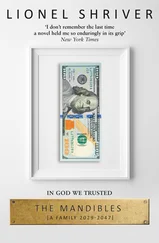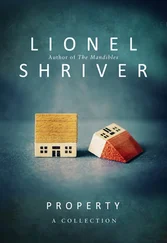

The Borough Press
An imprint of HarperCollins Publishers
1 London Bridge Street
London SE1 9GF
www.harpercollins.co.uk
Published by HarperCollins Publishers 2015
First published in Great Britain by Faber and Faber 1996
Copyright © Lionel Shriver 1996
Cover design © HarperCollins Publishers 2015
Cover photograph © Shutterstock.com
Lionel Shriver asserts the moral right to be identified as the author of this work
A catalogue record for this book is available from the British Library
This novel is entirely a work of fiction. The names, characters and incidents portrayed in it are the work of the author’s imagination. Any resemblance to actual persons, living or dead, events or localities is entirely coincidental.
All rights reserved under International and Pan-American Copyright Conventions. By payment of the required fees, you have been granted the non-exclusive, non-transferable right to access and read the text of this e-book on-screen. No part of this text may be reproduced, transmitted, down-loaded, decompiled, reverse engineered, or stored in or introduced into any information storage and retrieval system, in any form or by any means, whether electronic or mechanical, now known or hereinafter invented, without the express written permission of HarperCollins e-books
Source ISBN: 9780007578023
Ebook Edition © 2015 ISBN: 9780007301744
Version: 2015-08-20
TO DON AND PEGGY SHRIVER
from whom, on balance, I have inherited more strengths than foibles—the most parents could hope for any child
A son could bear complacently the death of his father, while the loss of inheritance might drive him to despair.
Machiavelli, The Prince
Table of Contents
Cover
Title Page
Copyright
Dedication
Epigraph
chapter one
chapter two
chapter three
chapter four
chapter five
chapter six
chapter seven
chapter eight
chapter nine
chapter ten
chapter eleven
chapter twelve
chapter thirteen
chapter fourteen
chapter fifteen
chapter sixteen
chapter seventeen
chapter eighteen
chapter nineteen
chapter twenty
About the book
Praise for A Perfectly Good Family
About the Author
Also by Lionel Shriver
About the Publisher
Don’t tell me,” said the taxi driver, rubber-necking at the formidable Victorian manor. “Your mother’s Norman Bates.”
“My mother’s dead,” I said. Harsh, but the information was so fresh for me, only two weeks old, that I was still repeating it to myself.
“Don’t you strain yourself, Missy.” He lunged from the front seat to take the luggage from me: two leather monsters and a bulging carry-on. I’d been overweight at Heathrow, and lucky that in November the plane was not too full.
“You want, I’ll haul these to the porch—”
“Not at all,” I said. “My brother likes to give me a hand. He always has.”
I pulled out a wad of dollars crumpled with fivers, unsure of the form for tipping taxis in North Carolina. An ostensible native, I clung to any ignorance about Raleigh as proof that I no longer belonged here. Skint most of my adult life, I reminded myself I would have more money soon and forced myself to hand over twenty percent. The generosity didn’t come naturally. McCreas are Scots-Presbyterian stock; I have stingy genes.
“But you’re spot on about the house,” I nodded upwards. “It does look like Psycho , all right. The neighborhood children all think it’s haunted.”
And wasn’t it? Handing over the bills, I thumbed Alexander Hamilton; after five years of starchy London tenners, a dollar felt like pyjamas.
“Or The Addams Family, mehbe. Take care now, ma’am. Hope your brother’s a muscly guy. Those cases is killers.”
“He’s pretty powerful.” I frowned. Since I still envisaged Truman as a delicate, timid tag-along about two feet high, that he was a beefy man of thirty-one who lifted weights in his attic living room was disconcerting.
The cab plowed down Blount Street, leaving me by chattel that would have been, until a fortnight before, all I owned. I turned to face what else I owned: a great, gaunt mansion built just after the Civil War.
There was no denying its magnificence. I had shown friends in London pictures of my family: my dark, glamorously beautiful mother in the days when she was genuinely happy instead of pretending to be; my father sporting his lopsided, hangdog grin as he accepted another award from the NAACP; my little brother Truman when he was photographed by the Raleigh Times throwing himself in front of a bulldozer; though I had no pictures, I discovered, of my older brother. None of these snaps made the slightest impression. Yet when I showed them a picture of my house, faces lit, hands clapped, eyebrows lifted. For the English, Heck-Andrews was everything a Southern residence was meant to be: remote, anachronistic, both inviting and forbidding at the same time. It fulfilled their tritest expectations, though I received complaints that there was no Spanish moss. That’s in South Carolina, I’d explain. And then we would get on to why I didn’t seem to have a Southern accent, and I’d be reassured that tell-tale traces had been eradicated.
Even in the last light of the day I could see the clapboard was flaking; so the failing manila paint was now my problem. It was apparent from the pavement that the ceilings of the first two floors were vaulting, all very exhilarating except they were murderously dear to heat, and the price of oil was now, I supposed, my problem as well. Yet paint and heat were only a third my responsibility—and this in itself would shortly become my biggest problem.
It was the Sunday of Thanksgiving weekend, a holiday which I only ever remembered in Raleigh-Durham, where gift shops were flogging pop-up pilgrim books; letting this exclusively American holiday nearly slip by unnoticed gave me a sense of accomplishment. I zipped up my jacket. No doubt the English didn’t picture the South in winter, but North Carolina has one, albeit mild. In fact, I remembered dressing for school huddled by the floor vent, stuffing my bunched knee-highs by its breath to pre-warm my socks. My parents were McCreas, too, and their remedy to the heating problem was all too simple.
I left the bags on the pavement and strode toward the broad, intricately ornamented front porch that skirted the mansion. This opulent, gregarious-looking expanse with a swing on one end was designed for mint juleps; but my parents had been teetotalers and, rather than recall long languid summer nights with fireflies and low laughter, I pictured squeaking morosely with Truman on the swing, frantic for my parents to go to bed. We hadn’t been very nice to them. Ordinarily on one of my visits home as I approached this same front door I’d be bracing myself for my mother’s protracted, claim-laying embrace—when the more I stiffened, the harder she would squeeze. Once my father died, her hugs had become only longer and tighter and were laced with hysteria. Now I was spared. A dubious reprieve.
We rarely entered through the front door, more comfortable with the side entrance into the kitchen. Ringing the bell, I touched the cold curlicued polygonal panes in the door, one of which had been replaced with plain window glass. The asymmetry never failed to vex Truman. But because the original had been shattered when my older brother put his arm through it—my father had been chasing him through the house to force him to turn down the volume of Three Dog Night—I treasured the flaw. There weren’t many signs of Mordecai left here.
Читать дальше














